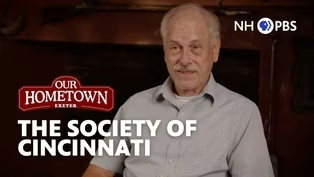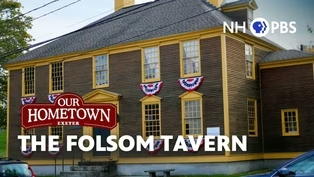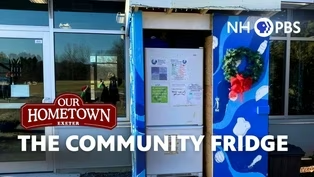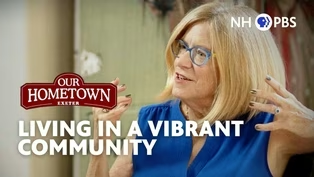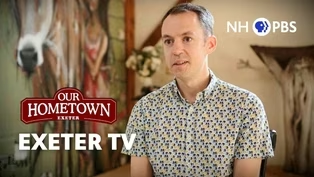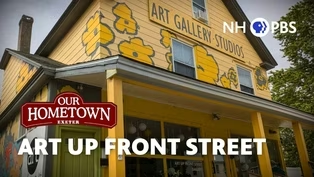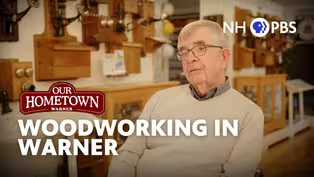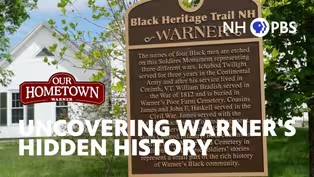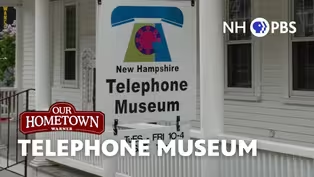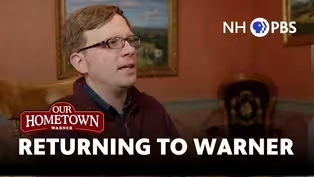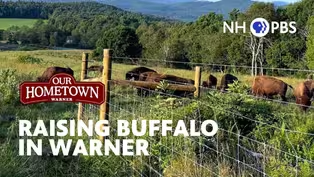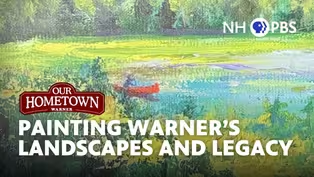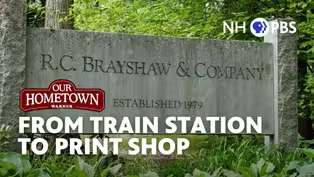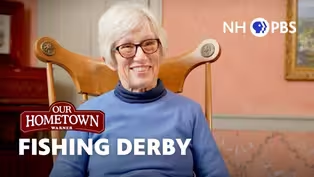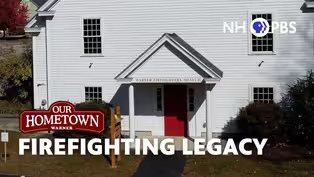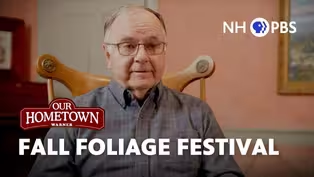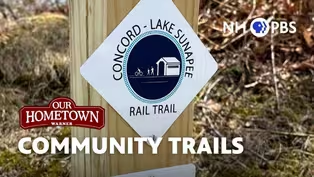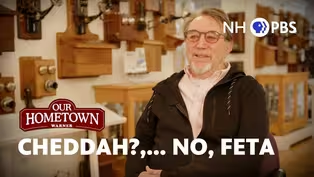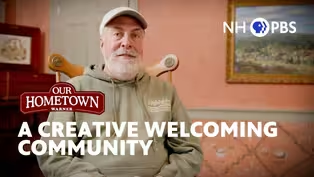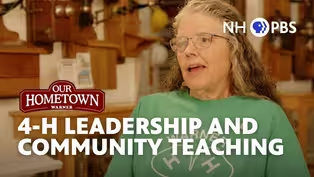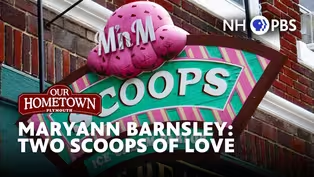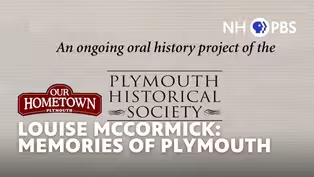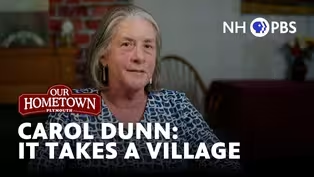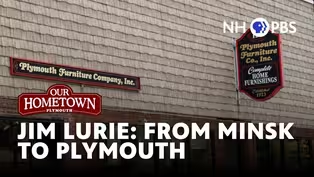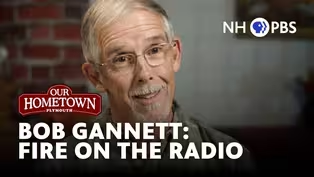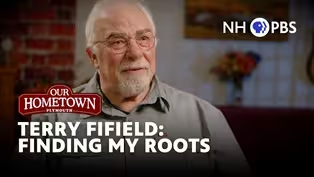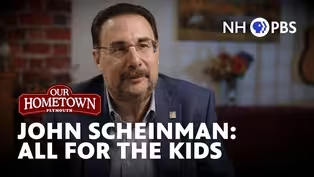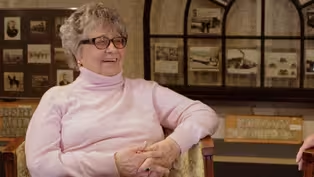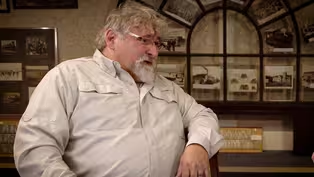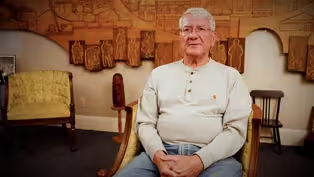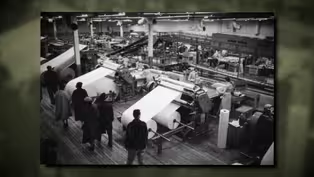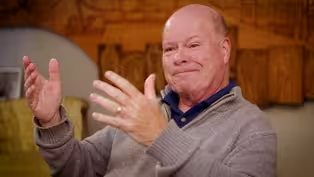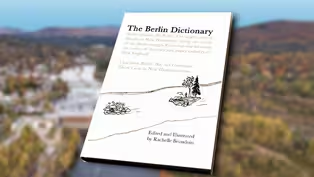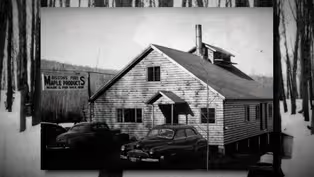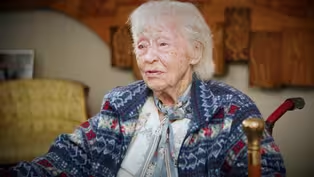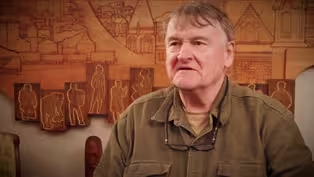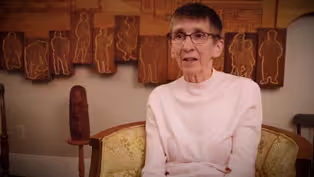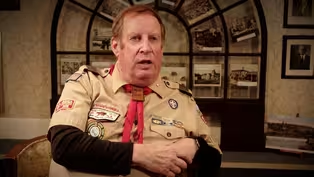Berlin | Walter Nadeau
Clip | 12m 40sVideo has Closed Captions
Walter tells us about Berlin's Skier/Soldier, Paul Petersen, and a love story.
Walter tells us about Berlin's Skier/Soldier, Paul Petersen, and the love story, chronicled in love letters, between Paul & his wife Kitty.
Problems playing video? | Closed Captioning Feedback
Problems playing video? | Closed Captioning Feedback
Berlin | Walter Nadeau
Clip | 12m 40sVideo has Closed Captions
Walter tells us about Berlin's Skier/Soldier, Paul Petersen, and the love story, chronicled in love letters, between Paul & his wife Kitty.
Problems playing video? | Closed Captioning Feedback
How to Watch
is available to stream on pbs.org and the free PBS App, available on iPhone, Apple TV, Android TV, Android smartphones, Amazon Fire TV, Amazon Fire Tablet, Roku, Samsung Smart TV, and Vizio.
My name is Walter Nadeau.
I'm 75 years old.
I retired as a deputy chief of the police department in 1999.
And after that, I became a member of the Berlin/Coos County Historical Society.
I'm currently vice president and have spent a lot of time there.
I'm here to talk about Paul Peterson and Catherine Peterson.
They were married on June 27, 1942.
Paul Peterson was drafted on April 5th, 1942.
He was an expert skier.
He was captain of the winter sports team back then.
It was called Winter Sports, not skiing.
It included snowshoeing and ice skating.
And so when he was drafted, he heard about the the ski they call it the ski troops.
And it wasn't known as a 10th Mountain Division yet.
It was 87th Infantry back then.
And to get in, you had to get three letters from notable people telling them about your skills in skiing.
So he was able to do that.
He did his basic training camp across South Carolina.
He and his wife wrote together, wrote to each other, all.
As a matter of fact.
They promised to write to each other every day.
And they did every day.
Mrs. Peterson, Catherine Lake, he called her kitty, saved 500 of his letters, and he was able to save 274 of her letters.
And in 2015, the family gave the letters to the Berlin/Coos County Historical Society.
And my project was for two and a half years.
I read every letter, organized them by person year.
month, date and topic discussed.
kitty really wanted to marry Paul.
So there was some discussion in their letters about getting married.
They didn't talk about it with their parents.
Catherine Her maiden name was Rozack.
Her family was Syrian and very strict family, whereas his family was very relaxed.
So she spent a lot of time at his house while he was gone.
He made the ski troops went for basic training out in Colorado in the process during that short period of time.
Camp Hill was being built in Colorado and in the high altitudes of the Colorado Rockies.
And the 10th Mountain Division was was organized out of the 87th Regiment.
she decided to move out there.
And he was doing so well as a as a skier that he became a ski instructor.
Then he became an instructor of instructors.
Matter of fact, he bragged that he flunked the general.
He said, I just want a three star general today.
He didn't pass my test, so I sent him home.
So she moves out there in one community, one of the coolest.
She moved to Ludville, Colorado, to be close to him, got a part time job, lived in something like a boarding house where it was a house with five bedrooms and people would rent a bedroom and share other facilities.
They still continued to write to each other every day, even though they were near each other.
she would say she was hoping to get a pass this weekend.
And he writes back, he says, Yeah, I'm quite sure I'm going to get a pass.
So she writes back and says, Well, you know, all the rooms are occupied.
So when you come visit this weekend, we're going to have to be kind of quiet so nobody can hear us.
So that was kind of a it was kind of funny because Paul Peterson was mostly a gentleman and his letters were she was more risque in her writings.
while he was there in Camp Hill, he took a ski test that was developed and he was one of the highest scorers.
And they took the best 26 skiers.
And he was one of them, sent them to the Canadian Rockies at Lake Louise in Columbia.
And the military was testing new equipment in in the snow drifts.
And the there was like Chevrolet, a Studebaker and various other car companies that were developing equipment that they could use in that kind of terrain.
So their job was to make sure that there were bridges built over crevasses and things like that, and that all that experimentation was done safely.
his brother Ernest was a captain in the North Division, and one was one of the guys that developed the training that they did there.
And a lot of people to them as the ski troops, but they were called Martin Division for a reason.
They were training to climb mountains.
They developed many new techniques to climb rocky cliffs, how to lure wounded soldiers down over the cliffs.
And so they they trained in the wintertime in Colorado, 30 degree below 30 below zero temperatures, sleep out there at night and carry their equipment.
And then in the summertime, they were sent to Texas and they were they would do 25 to 30 mile force marches every day carrying heavy equipment in that hot heat.
And they went back to the Colorado Rockies.
And lots of times during their training, they lost as many as 35 to 40% of their personnel because the training was so rugged.
A lot of them got frostbite and he would make fun of them because he knew how to dress in cold weather, at least, you know, I put on three pairs of socks.
These guys only put on one.
What's the matter with them?
You know?
So in 1943, the Japanese had taken over the So the 10th Mountain Division was dispatched to the Aleutian Islands, to the Isle of Kiska.
When they got there, it was very, very foggy.
And when they invaded the island, the Japanese apparently took off in the fog in the middle of the night.
And there are no Japanese soldiers there at all.
And Paul wrote some of his letters from that island, from one of the cabins that the Japanese had built.
the military was training these men, the 10th Mountain Division men, for a very special mission that they were expecting to happen.
And the 10th Mountain Division were probably the Navy SEALs of the day.
They were America's best trained troops.
So finally, in the fall of 1944, the allies were having a very difficult time with the Germans in northern Italy, the Apennine mountain range.
The Germans had repelled allied troops twice over a few months time.
So in December 1944, the 10th Mountain Division were dispatched to Italy, to the Apennine Mountain range.
The Germans got word that the 10th was coming.
Didn't bother them.
We've we've repelled the Allies twice.
And the guys we were repelled were battle hardened troops, whereas the 10th Mountain Division hadn't seen any action at all.
So they're really confident they were going to repel the 10th Mountain Division.
So there was a place called Reverviche at the lower end, at the southern end of the Japanese mountain range.
The Germans were firmly entrenched.
The commander of the 10th developed divided them into four groups in the early morning hours.
They climbed the backside of these mountains up the cliffs exactly what they were trained for.
The Germans were not expecting them.
So there was a really intense battle there, and they kept moving the Germans north and kept driving them back.
And they broke through the German lines in northern Italy.
And finally, on May 2nd, 1945, the Germans were defeated in Italy.
And then the end of the war in Europe came about in May 1945.
And that was pretty much expedited by the 10th Mountain Division.
So they were sent home to training camp again.
They were preparing to go to fight the Japanese in the Pacific for an anticipated battle that might happen in November 1944 45.
But as we all know, the war ended with the dropping of the bomb on Hiroshima and Paul Petersen was discharged on November 1st, 1945.
He was awarded the Bronze Star, as were many men in the 10th Mountain Division, and they awarded the Bronze Star.
A lot of them were awarded that because they were all participants in a very intense battle, of which there were a large number of casualties losses.
And they were very, very thin.
Paul came back to his wife in Berlin.
He really wanted to be a minister, a Episcopal Episcopalian minister.
And however, when he came back, his wife was living at her house now.
And they said they could have the house if they would take care of one of their aging relatives.
So as a result, he didn't go to school.
He had to stay home, go to work.
He was a machinist.
Matter of fact, he was a machinist prior to World War Two.
He trained here in Berlin by the NYA National Youth Administration was a program started by the government during the Depression.
A lot of guys were trained to be machinists, and he was one.
And so she did most of her work as an accountant.
She did some accounting work for many local businesses and he continued to work at Cross Machine Shop in Berlin until his retirement.
And she her final job was with the Berlin Waterworks.
She did all of their accounting for them.
They had two children, two girls.
One's name.
Her name was Christine.
She was born in 1948.
They had another child named Corinne who was born four years later and several grandchildren.
they lived happily at her, her family's home, her manufacturer, her grandfather, grandparents had built that house on 90 hillside Avenue he died in 2005.
He was like 86 years old, Mrs. Peterson.
Kitty passed away in 2015.
And just just prior to her death, her children gave us the letters that we were we were very fortunate to get that.
The 10th Mountain Division Resource Center has a digital copy, as does the New England Ski Museum.
When Christine, one of the daughters, gave me the letters, she says, we didn't read any of them.
We felt they were too private.
And we at first we thought nobody should read them, so we were going to burn them.
And when she gave them to me, they were very neatly wrapped in red, white and blue ribbon, probably for 70 years like that.
so I took a photograph of the of the letters wrapped.
We kept the ribbons.
I've got them.
Exeter | The Society of Cincinnati
Video has Closed Captions
Clip | 6m 13s | Dana tells us about the genesis of the Society of Cincinnati in New Hampshire. (6m 13s)
Video has Closed Captions
Clip | 5m 57s | Rebeccah tells us about the beautiful architecture & rich history of the Folsom Tavern. (5m 57s)
Video has Closed Captions
Clip | 4m 11s | Alexis Cargill speaks about the Community Fridge; a self-serve food clearinghouse. (4m 11s)
Exeter | Living in a Vibrant Community
Video has Closed Captions
Clip | 3m 30s | Cathleen Toomey talks about moving to, and living in such a diverse, thriving community. (3m 30s)
Exeter | Indigenous Peoples & the Rebirth of the Squamscott
Video has Closed Captions
Clip | 6m 28s | Denise and Paul Pouliot tell us about the indigenous roots of many of the area names. (6m 28s)
Video has Closed Captions
Clip | 5m 21s | Bob Glowacky tells us about the many things that Exeter TV is doing to connect & build community. (5m 21s)
Video has Closed Captions
Clip | 4m 39s | Rose talks about the vibrant art community in Exeter, and how she started her studio & gallery. (4m 39s)
Warner | Woodworking in Warner
Video has Closed Captions
Clip | 2m 10s | Jim McLaughlin shares how woodworking deepened his bond with Warner. (2m 10s)
Warner | Uncovering Warner's Hidden History
Video has Closed Captions
Clip | 5m 7s | Discover Warner’s untold Black history with local historian Rebecca Courser. (5m 7s)
Video has Closed Captions
Clip | 6m 22s | Graham Gifford shares how Warner’s telephone museum came to life—surprising all. (6m 22s)
Video has Closed Captions
Clip | 2m 53s | Ian Rogers shares how travel and Warner’s community shaped his independent spirit. (2m 53s)
Warner | Raising Buffalo in Warner
Video has Closed Captions
Clip | 4m 47s | Brian & Kira Farmer share why they moved to Warner and raise buffalo on their farm. (4m 47s)
Warner | Painting Warner's Landscapes and Legacy
Video has Closed Captions
Clip | 2m 17s | Artist Mimi Wiggin paints her family’s legacy and Warner’s landscapes and traditions. (2m 17s)
Video has Closed Captions
Clip | 7m 57s | Neil Nevins tells about their non-profit, "Main Street Warner". (7m 57s)
Warner | From Train Station to Print Shop
Video has Closed Captions
Clip | 5m 56s | Jeremy reflects on the vibrant life surrounding Warner’s beloved train station. (5m 56s)
Video has Closed Captions
Clip | 2m 24s | Nancy Martin shares funny, fishy memories from Warner’s kids’ derby. (2m 24s)
Video has Closed Captions
Clip | 5m 1s | The rich history of Warner's fire department. (5m 1s)
Warner | Fall Foliage Festival
Video has Closed Captions
Clip | 2m | Ray Martin reflects on decades organizing the Warner Fall Foliage Festival and service. (2m)
Video has Closed Captions
Clip | 3m 52s | Tim Blagden shares how Warner’s abandoned rails became a community trail vision. (3m 52s)
Video has Closed Captions
Clip | 7m | Apryl Blood and Patty Anderson discussing their roles in the community. (7m)
Warner | Cheddah?,... No, Feta
Video has Closed Captions
Clip | 4m 34s | Author David Elliott speaks about moving to Warner. (4m 34s)
Warner | A Creative Welcoming Community
Video has Closed Captions
Clip | 4m 7s | As a radio guy and author, Matt Esenwine talks about coming to Warner. (4m 7s)
Warner | 4-H Leadership and Community Teaching
Video has Closed Captions
Clip | 5m 41s | Susan Jenna and Abigail R. reflect on decades of 4-H leadership and community teaching. (5m 41s)
Video has Closed Captions
Clip | 3m 15s | Dan Salzer and Jonathon Picard talk about Pemi Baker TV. (3m 15s)
Video has Closed Captions
Clip | 3m | Maryann Barnsley tells us about a childhood dream. (3m)
Video has Closed Captions
Clip | 2m 1s | Katharina Kelsey and her husband made a list, Plymouth checked all the boxes, and so much more. (2m 1s)
Plymouth | The Happiness Quest
Video has Closed Captions
Clip | 2m 34s | Dr. Marie Sanders relates what can happen when an entire town works together to discover happiness. (2m 34s)
Plymouth | Memories, Stories and Cake
Video has Closed Captions
Clip | 5m 41s | Patricia Hoyt came to Plymouth for college, launched her career here. (5m 41s)
Plymouth | Memories of Plymouth
Video has Closed Captions
Clip | 1m 55s | Louise McCormick is a townie. She grew up in Plymouth, and has spent most of her life here. (1m 55s)
Plymouth | Local Foods Plymouth
Video has Closed Captions
Clip | 3m 23s | Marianna Evans talks about Local Foods Plymouth, and how the pandemic helped to create a model. (3m 23s)
Video has Closed Captions
Clip | 2m 21s | Carol Dunn tells about how this amazing town bonded together to save her business on Main Street. (2m 21s)
Plymouth | From Minsk to Plymouth
Video has Closed Captions
Clip | 3m 41s | Jim Lurie tells us how in 1917, his grandfather travelled from Minsk, Russia, across Siberia. (3m 41s)
Video has Closed Captions
Clip | 1m 34s | Bob Gannett speaks about an interesting story unfolding as he was on the radio. (1m 34s)
Video has Closed Captions
Clip | 4m | Terry Fifield has lived in a lot of places, but found that the Plymouth area to be the best. (4m)
Plymouth | Community... on Wheels
Video has Closed Captions
Clip | 6m 14s | Mike Currier talks about the roots of the Plymouth Skate Park. (6m 14s)
Video has Closed Captions
Clip | 1m 45s | Bill Clark talks about, even with growth and progress, Plymouth is a special town. (1m 45s)
Video has Closed Captions
Clip | 4m 19s | Suzan Gannett talks about Artistic Roots, and the programs and passions that it has inspired. (4m 19s)
Video has Closed Captions
Clip | 2m 31s | John Scheinman shares how the skills needed in successfully coaching can be used. (2m 31s)
Plymouth | A Commitment of Caring
Video has Closed Captions
Clip | 5m 1s | Jessica Dutille talks about re-building community, after the pandemic changed the world. (5m 1s)
Video has Closed Captions
Clip | 4m 16s | Yvonne recalls growing up in Berlin, and speaking two languages in school. (4m 16s)
Video has Closed Captions
Clip | 6m 41s | Andre speaks to us about growing up in Berlin. (6m 41s)
Video has Closed Captions
Clip | 12m 40s | Walter tells us about Berlin's Skier/Soldier, Paul Petersen, and a love story. (12m 40s)
Video has Closed Captions
Clip | 3m 36s | Roland talks about working in every aspect of the paper industry, over 4+ decades. (3m 36s)
Video has Closed Captions
Clip | 4m 19s | Renney tells a couple of great stories about growing up in Berlin. (4m 19s)
Video has Closed Captions
Clip | 5m 37s | Berlin has a language all its own, and Rachelle decided to compile a dictionary of words. (5m 37s)
Video has Closed Captions
Clip | 4m 24s | Olive speaks about growing up in Berlin, in a family that owned Bisson's Sugar House. (4m 24s)
Video has Closed Captions
Clip | 3m 5s | Lorna recalls heading into Berlin on Friday nights, for shopping & meeting up with friends (3m 5s)
Video has Closed Captions
Clip | 3m 54s | Moving to Berlin was a dream come true for Haven, as he loved working in the woods. (3m 54s)
Video has Closed Captions
Clip | 2m 43s | Diane talks about going from a 45 year career in the banking industry. (2m 43s)
Video has Closed Captions
Clip | 6m 40s | Dennis tells the story of the history of boy scouts in Berlin, NH. (6m 40s)
Providing Support for PBS.org
Learn Moreabout PBS online sponsorshipSupport for PBS provided by:
